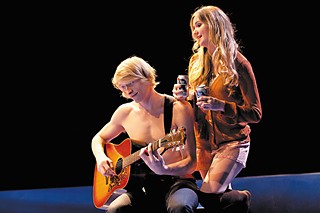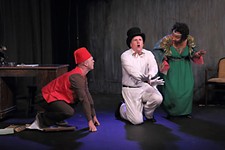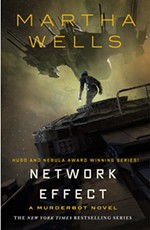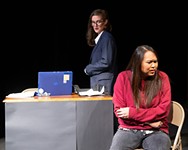360 (round dance)
Steven Dietz's new adaptation of Schnitzler's 'Reigen' is solid and intriguing
Reviewed by Elizabeth Cobbe, Fri., Nov. 18, 2011
360 (round dance)
Oscar G. Brockett Theatre, 23rd & San Jacinto, 471-5793www.finearts.utexas.edu/tad
Through Nov. 20
Running time: 1 hr., 30 min.
On the surface, Steven Dietz's 360 (round dance) appears to be about the sexual encounters that link people together. Eight actors face off with one another in the circular playing space, playing a game of sexual politics that eventually leads back to its own beginning.
Yet despite the warning from the University of Texas Department of Theatre & Dance that the play contains mature content, there's really not that much mature content, at least as far as things like nudity or rough language go. What's mature about this adaptation of Arthur Schnitzler's Reigen – a play that caused a riot in its own day – is the sensitivity with which the encounters between these people are depicted. Desire and resentment battle it out in every scene but never in the same way. A maid resists the crass advances of her employer's adult son, then the adult son attempts an affair with a married woman, who then confronts her husband. The characters run a relay around the play, handing off the action from one to the next, and what finally emerges is a complex story about the harsh dynamics of human interaction.
It is a mark of Dietz's skill as a playwright that the circular structure of the play is clearly established but never becomes predictable. The pacing of the script and the direction, from Master of Fine Arts directing candidate Courtney Sale, is sharp and well-measured. The motif of the circle, played out in the story, the staging, and the set (designed by Chris Yoo), might have been nothing more than a gimmick, but in this production it is an intriguing framework for the play's ideas.
The ensemble performs with consistency, although in some cases the casting doesn't achieve what it ought to: An actor who plays one part well never quite earns the audience's confidence in another. It's a case of almost but not quite in a show that is otherwise a solid and intriguing work. It's not the scandalous sort of play one might be led to expect – especially not for theatregoers accustomed to the more experimental side of Austin's theatre scene – but it is a smart play with depth and texture. As thought experiments go, 360 is fruitful and worthwhile.











